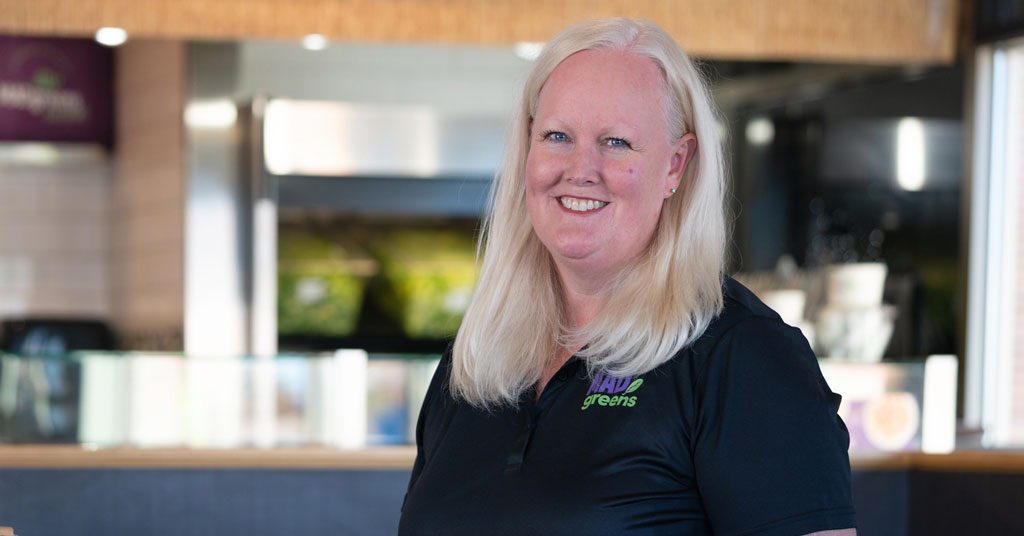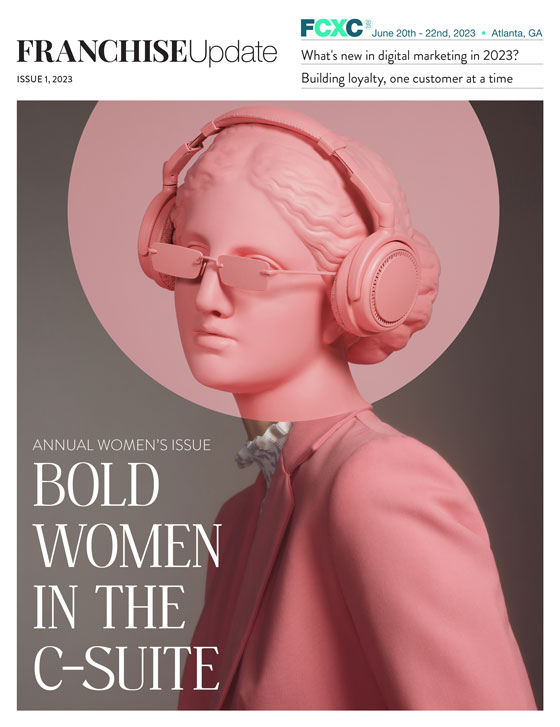Head of Lettuce: Leading Salad Collective's 3 “better for you” brands

Name: Darden Coors
Title: CEO
Company: Salad Collective (Mad Greens, Snappy Salads, Tokyo Joe’s)
Units: 65 (27 Tokyo Joe’s, 25 Mad Greens, 13 Snappy Salad)
Age: 51
Years in franchising: 4
Years in current position: 9
You might say Darden Coors’ tongue is planted firmly in her cheek, at least some of the time. After all, she’s referenced herself as the Head of Lettuce and CEO of Salad Collective, a “consaladated” group of franchise brands that includes Mad Greens, Snappy Salads, and Tokyo Joe’s.
All kidding aside, Coors (yes, Coors) left a career in law that included a variety of legal counsel positions with public and privately held Coors-family enterprises and spent 4 years as assistant general counsel for Einstein Noah Restaurant Group. This was the job that piqued her interest in the fast casual restaurant world.
She joined Salad Collective in December 2013, when the Coors family enterprises purchased a majority stake in Mad Greens. She led the company’s growth and market expansion, its merger with Snappy Salads in 2019, and its acquisition of Tokyo Joe’s in 2022. Today, the Salad Collective includes three brands and 65 restaurants.
Coors, who describes her leadership style as “thoughtful, collaborative, and deliberate,” says the company is ready for more growth. “We are launching franchising efforts for Mad Greens in 2023 and are bullish about adding more units with the support of experienced multi-unit operators,” she says.
In addition to adding franchisees and units, she says the company plans to add corporate stores, build a new prototype store, and devote more energy to digital transactions this year. And if they can acquire another brand that adds value to the Salad Collective, it could become part of the mix, too.
LEADERSHIP
What is your role as CEO? I am the primary point person for our board and our ownership groups. Additionally, I set the direction and long-term goals for the team and the brands, as well as the priorities and vision for the company.
How has Covid-19 affected the way you have led your brand? Covid-19 really brought our team closer together with everything we went through and improved my collaboration with them on the big questions. I also believe it shifted my leadership focus to be employee-first rather than customer-first. The pandemic brought my attention to the well-being of our employees to a whole new level.
Describe your leadership style. I would say I’m thoughtful, collaborative, and deliberate. I am a lawyer-turned-restaurant-executive and haven’t been able to shake the habit of overanalyzing things. As part of that, getting input from different people and perspectives in our organization is really important to me. My favorite question to ask employees in our restaurants is, “How can I help you?” If we don’t know a problem or a pain point exists, we can’t solve it.
What has inspired your leadership style? My dad really inspired my leadership style. He was a lot more outgoing than I am and loved to bring fun into the workplace as a leader. He adopted the motto at his company, “Fun Happens.” I like to keep that in mind as part of my approach to leadership as well. He understood that the jobs people were doing for his company were hard, so he tried to make it enjoyable and be as approachable and engaged with his employees as he could. I admired that a lot, and think I bring my own spin on that to my leadership style. One of our company values is, “Have Work at Fun.”
What is your biggest leadership challenge? Truthfully, being in charge and the ultimate decision-maker doesn’t come naturally to me. However, I have had great mentors to guide me, as well as surrounded myself with a strong team who balance me out and make my job easy.
How do you transmit your culture from your office to frontline employees? It starts with hiring the right people and building a strong culture-forward team at every level of the organization. We have always felt we had a great culture, and in 2022 we spent a lot of time to capture it and put words (and songs!) to it by engaging people at every level. It was an amazing and powerful exercise. One of our values is “Shoulder to Shoulder.” We work alongside each other to train, teach, and support each other. We don’t get caught up in titles. We roll up our sleeves and get done what needs to be done—and have fun doing it. So, for us, to perpetuate that, we look to hire team players, individuals with positive attitudes, those who smile and laugh and find joy in their work. Ultimately, you have to train up or weed out the people who haven’t bought in to the culture you work so hard to build. Culture has to be a benchmark and measuring stick for everything we do.
How can a CEO help their CMO develop and grow? There has been a lot of disruption to traditional marketing in recent years. You have to challenge your CMO to try new things and be okay with it not yielding the results you want because they were able to learn something regardless. Another important way you can help them grow is by encouraging them to build their community of peers through networking opportunities—help them see what others in their position are doing, what external resources are available and worth the investment, benchmark our marketing against peers, and really make us all better at what we do.
Where is the best place to prepare for leadership: an MBA school or OTJ? I fall squarely in the on-the-job camp.
Are tough decisions best taken by one person? How do you make tough decisions? For me, collaboration is key when it comes to making tough decisions. At the end of the day, I know it is on me, but I will actively seek out input before I make a final decision. I want to hear from multiple voices in the organization—from IT to marketing to accounting so I can appreciate the full impact.
Do you want to be liked or respected? Respected. I don’t need to be liked. That said, in some ways, part of my job is to be liked. People work for people and not companies. I think my role is head cheerleader as much as anything else, but respect has to come first, and then you can earn the title of being liked.
Advice to CEO wannabes: Don’t think you know it all. Listen and stay in touch with your frontline employees.
MANAGEMENT
Describe your management style. I give my people a lot of freedom. I try to hire people who are great in their field and who can do it better than I could. We have an open office environment, which encourages collaboration and gives people the flexibility to do their job the way they see fit.
What does your management team look like? It consists of four women and two men, so we are a female-forward organization. We also have a high percentage of women in the general manager roles of our restaurants, and I’m really proud of that. My management team includes the VPs of ops, HR, marketing, IT, and finance/accounting.
How does your management team help you lead? They are experienced and confident in their areas of expertise so they constantly keep me informed. We also get along with each other well, which is key. There is a lot of mutual respect and open communication between us, but also healthy debate.
Favorite management gurus: Do you read management books? Lately, when it comes to individuals, Simon Sinek is one of my favorites. Otherwise, I try to grow through connecting with other CEOs, especially those local to where I am.
What makes you say, “Yes, now that’s why I do what I do!”? We start each meeting off with a “Mad Story” or a “Snappy Snippet” where we celebrate an admirable action a team member has done. It’s really inspiring and makes you realize how much people care and what great people we have who live out our culture every day.
OPERATIONS
What trends are you seeing with consumer spending habits in your stores? Consumers are spending more with our restaurants digitally than ever before. This has made us rethink how we communicate and connect on a personal level with our guests. Additionally, I think consumers value convenience and customization more than ever, and that works well with our restaurant and our technologies.
How is the economy driving consumer behavior in your system? I think the customer mix shifts a bit with an economic downturn. Being in the fast casual space, you get people trading down from casual or fine dining into fast casual, and people trading down from fast casual to fast food or eating at home. However, grocery prices are elevated, so for now I think people aren’t as quick to move away from the convenience of eating out when it’s as expensive as it is to eat at home.
What are you expecting from your market in the next 12 months? The next 12 months have a lot of unknowns in the economy—like whether we are in a recession or if a recession is coming, and how long will it last. That’s the hardest part, because high interest rates could affect how people spend their money and what they can allocate to eating out. But I’m optimistic. Fast casual is a nice niche to be in when there’s uncertainty in the economy. The other unknown is the state of the supply chain and if we get price and availability stability. We are going to remain focused on top-line growth and manage what we can control.
Are commodity/supplies costs any cause for concern in your system? In 2022, we have seen big fluctuations, and commodities have not been as stable as in the past. Hurricanes, fires, diseases, and other natural disasters as well as labor supply have affected this. There definitely have been concerns and pressures on our system and business model. We are hopeful those things settle down a bit, but it’s a big unknown how long that will last.
In what ways are political/global issues affecting the market and your brand? The current employment and environmental legislation are often a big topic in our industry, along with supply chain. We just have to continue to be aware of what’s going on and take them into consideration as we plan for the future.
PERSONAL
What time do you like to be at your desk? I like to be there at 9 a.m., but usually I’m there at 8:30.
Exercise in the morning? Wine with lunch? Typically, I walk the dog every morning and that is my time to get my thoughts together and plan my day.
Do you socialize with your team after work/outside the office? Not necessarily, because we all understand that everyone has their own lives, kids, and activities, and we don’t all live that close to each other.
Last two books read: In the middle of reading The Infinite Game by Simon Sinek as well as Love Does by Bob Goff, which touches on generosity.
What technology do you take on the road? My phone and my laptop.
How do you relax/balance life and work? There are a few things I do—play tennis, walk the dog, listen to true crime podcasts, and watch murder mystery shows. I’m also a new empty nester. My son was very active and had his activities to go to after school, which naturally became my hobbies. So now I am looking for new ones.
Favorite vacation destinations: I’m not a beach person, but if I can vacation with an ocean or a body of water, that is ideal. Northern Europe has been one of my favorite places to visit.
Favorite occasions to send employees notes: I have three different occasions where I like to send employees notes: after we implement a new software, solve an issue, or hit a goal for HR; when the team is the “Mad story” for the week; and celebrating work anniversaries.
Favorite company product/service: My favorite salad is the Don Quixote salad with shrimp, Mad spice avocado, and creamy ginger dressing.
BOTTOM LINE
What are your long-term goals for the company? For Salad Collective to be a multi-brand, culture-forward restaurant group. We want to be thoughtful and long-lasting by growing in a smart way, bringing forward approachable, healthy food options to America and beyond.
How has the economy changed your goals for your company? I don’t think it’s changed them more than delayed them slightly over the last couple of years. We have spent most of 2022 preparing for new unit growth again for Mad Greens and investing in our culture and our people. We completed the acquisition of a new brand, Tokyo Joe’s, and inherited a great team of people there. Growth through acquisition has always been part of our strategy, and we had that on hold in 2020/2021 because of the economic and global situation.
Where can capital be found these days? We are not actively in the capital market.
How do you measure success? For me it has always been more related to things like is our organization healthy, are we developing people, do we have the right talent we need to accomplish our goals, and do we have staying power? We can always find a way to meet financial goals, but if it is only in the short term, that’s not really success.
What has been your greatest success? Building and developing the team we have with the comradery and high culture that goes along with it.
Any regrets? Not believing in myself sooner.
What can we expect from your company in the next 12 to 18 months? We are launching franchising efforts for Mad Greens, which is a big step, so we can expect many exciting things coming down the pipeline: signing on franchisees, building one or two new corporate stores with the new prototype, as well as a greater focus on digital transactions. Also, we’re always looking to add new brands to our current portfolio at Salad Collective.
Share this Feature
Recommended Reading:
FRANCHISE TOPICS
- Multi-Unit Franchising
- Get Started in Franchising
- Franchise Growth
- Franchise Operations
- Open New Units
- Franchise Leadership
- Franchise Marketing
- Technology
- Franchise Law
- Franchise Awards
- Franchise Rankings
- Franchise Trends
- Franchise Development
- Featured Franchise Stories
FEATURED IN

Franchise Update Magazine: Issue 1, 2023








 The franchise listed above are not related to or endorsed by Franchise Update or Franchise Update Media Group. We are not engaged in, supporting, or endorsing any specific franchise, business opportunity, company or individual. No statement in this site is to be construed as a recommendation. We encourage prospective franchise buyers to perform extensive due diligence when considering a franchise opportunity.
The franchise listed above are not related to or endorsed by Franchise Update or Franchise Update Media Group. We are not engaged in, supporting, or endorsing any specific franchise, business opportunity, company or individual. No statement in this site is to be construed as a recommendation. We encourage prospective franchise buyers to perform extensive due diligence when considering a franchise opportunity.